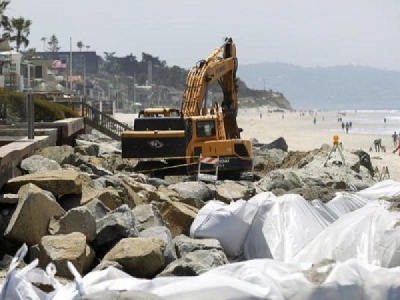
Posted on May 22, 2018
By Phil Diehl, The San Diego Union-Tribune
Herb Montgomery and his wife, Janet, have lived in Del Mar’s low-lying Beach Colony just east of Camino Del Mar for 20 years.
He knows the ocean is creeping closer to his property and he says the city has an obligation to protect his home, valued at $3.2 million, from the rising waters.
But considering a strategy that allows for the eventual removal of threatened structures, even as a last resort, would be tantamount to financial ruin for him and other property owners in the small, wealthy coastal city.
“It won’t work for Del Mar,” Montgomery said.
The mere mention of the strategy known as “planned retreat” in the city’s planning documents will “put a cloud of doubt over the future” and cause property values to plummet, he said last week. Beachfont homes in Del Mar typically list for more than $5 million, and a new blufftop mansion on Stratford Court sold for $21.5 million last year.
Current owners would be reluctant to invest in improving and maintaining their homes, Mongomery said, and banks would be unlikely to loan money to buy or improve homes that the city has acknowledged could be removed or destroyed.
Many of the city’s residents have fought long and hard against including planned retreat as part of their strategy. They say seawalls, sand retention and beach replenishment are better ways to preserve their coastal homes, and that their property values would plummet if they acknowledge that someday their property could be inundated by the sea.
However, the California Coastal Commission requires all coastal cities to have a sea-rise adaptation plan, and to include planned retreat as part of their strategy.
Failure to comply could result in the Coastal Commission refusing to certify the city’s plan, thus robbing Del Mar of the authority to approve permits for developments such as seawalls, homes, businesses, roads and other structures. Instead, that authority would fall to the Coastal Commission.
With those possibilities in mind, Del Mar will take another look Monday at the possible inclusion of “planned retreat” as part of its plan for adapting to rising sea levels.
Planned retreat, also called “managed retreat,” is a strategy of gradually removing manmade structures such as seawalls, homes, roads and public buildings in advance of the rising sea. Del Mar has about 600 homes within a few feet of sea level, mostly in the North Beach and Beach Colony areas near the San Dieguito River, that could be affected by the strategy.
Climate change has been widely acknowledged by scientists, but predicting the amount of sea-level rise, like the weather, is difficult.
“We may see five feet of sea-level rise earlier than previously thought,” states a letter dated April 16 to Del Mar Mayor Dwight Worden from Coastal Commission program manager Garbriel Buhr.
The California Ocean Protection Council adopted statewide guidance in March that recommends planning for a 7.1-foot sea-level rise by 2100 for the Del Mar area, the letter states. Seas could rise as much as 10 feet by 2100 if the polar ice sheets melt significantly. And by most accounts, the water will continue to rise for centuries.
Typically, the retreat strategy is used with other planning techniques such as identifying high-risk areas, regulating types of structures, and instituting buy-back programs or financial aid for relocation.
Del Mar residents say no form of planned retreat is practical for them because of the large number of homes involved, the high property values, and the lack of space at higher elevations to move to in the small city.
Montgomery said cities around the world have found ways to hold back the sea.
“Look at Holland,” he said. “They have been below sea level almost forever, and they are dealing with it.”
Montgomery said if the state forces the city to include a retreat policy, “They better come along with a big heavy bucket of money. People should be remunerated for the investments they made.”
Not everyone in Del Mar opposes including managed retreat as part of a multi-faceted adaptation policy.
“Global warming is real, and sea-level rise is a fact,” said resident Ann Feeney, chair of the city’s Sustainability Advisory Board and a professor at The Scripps Research Institute, in a letter to the City Council.
“Sand replenishment is great, but will become increasingly difficult, expensive and less productive as the sea level rises,” she said. “I hope that the council will include managed retreat as a consideration in the adaptation plan, after other strategies become unfeasible.”
Del Mar began working on its Coastal Resiliency/Sea Level Rise Adaptation Plan in 2015 with the first of two Coastal Commission grants.
The city formed a Sea Level Rise Technical Advisory Committee that met more than 20 times before concluding in January that it was too early to consider planned retreat as an option. The city’s Planning Commission agreed in January, and recommended not to include managed retreat as an option for private property.
The City Council took on the topic in April, but postponed a final decision until Monday to fine-tune the language.
The latest version of the city’s strategy, modified after the April meeting, states that “as part of future plan review and plan amendment, relocation will only be considered if necessary and feasible.”
Retreat will only be considered as a last resort, it states.
“Given the uncertainties of climate science and the efficacy of adaptation strategies, planned retreat will remain one strategy to be re-evaluated and considered if necessary as part of future planning and plan amendment if the city’s favored strategies prove unable to meet the indentified goals,” the updated policy states.
Once approved by the City Council, the adaptation plan go to the Coastal Commission to be included in the city’s local coastal program, or LCP.
Source: The San Diego Union-Tribune





